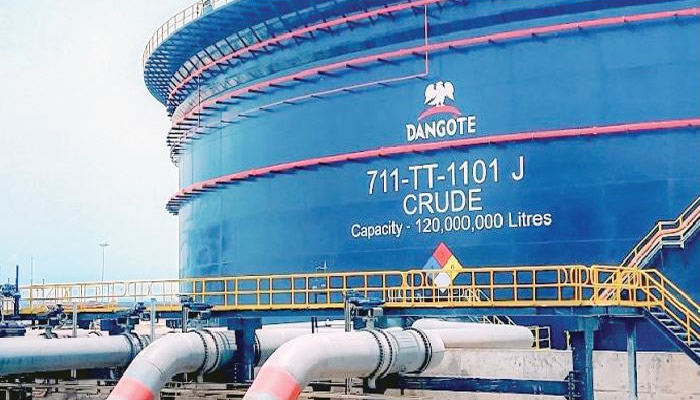The Dangote Petroleum Refinery has clarified that its recent decision to scale down crude oil inflows is a deliberate, strategic response to ongoing fluctuations in global crude prices and domestic market dynamics. The management emphasized that the measure is aimed at ensuring operational efficiency and sustainability amid the current volatility in the oil market.
According to industry sources, the refinery’s temporary reduction in crude intake is not a sign of production setback but rather a calculated adjustment to align processing volumes with evolving market conditions. This comes as global oil prices have witnessed oscillations in recent weeks, influenced by factors such as geopolitical tensions, production cuts by OPEC+, and varying global demand levels.

A statement from the Dangote Group noted that the decision was informed by the refinery’s commitment to maintaining competitive pricing and ensuring that Nigeria’s downstream sector remains stable. The company reiterated that the refinery remains fully operational and continues to supply refined petroleum products, including diesel, aviation fuel, and naphtha, to the domestic and regional markets.
“The Dangote Refinery operates with a flexible system that allows us to adjust our crude intake depending on prevailing market realities. Our focus is on achieving efficiency, quality, and affordability in fuel production for Nigeria and the broader African market,” the statement read.
Industry analysts believe that the refinery’s move demonstrates prudent risk management and market responsiveness. They explained that by moderating crude intake, the company can avoid overexposure to price fluctuations, manage inventory effectively, and preserve profitability in the face of unstable global crude benchmarks.
“The refinery’s decision to adjust intake volumes is a reflection of market intelligence. It’s not unusual for large refineries to calibrate operations to align with price trends. Dangote Refinery’s flexibility is a positive indicator of its operational maturity,” said energy economist, Dr. Emmanuel Adigwe.
He further observed that the refinery’s cautious approach could help stabilize domestic fuel prices and reduce pressure on the naira, especially as the facility plays a growing role in Nigeria’s energy balance and foreign exchange conservation efforts.
Dangote Refinery, Africa’s largest single-train refining complex, began operations earlier this year with a capacity to process 650,000 barrels of crude per day. The facility was designed to meet Nigeria’s entire refined product needs and export surplus to regional markets. Since its commencement, it has supplied premium motor spirit (PMS), diesel, and aviation fuel to local marketers, significantly reducing Nigeria’s dependence on imported refined products.
The refinery’s latest decision also coincides with global economic uncertainties and fluctuating demand patterns, particularly as some economies tighten monetary policies and energy consumption adjusts to slower growth projections. Crude prices have been hovering between $80 and $90 per barrel in recent weeks, prompting refiners worldwide to adopt cautious operational strategies.
In addition to managing its crude inflows, Dangote Refinery has also been engaging with local crude producers to enhance supply stability under mutually beneficial pricing agreements. Sources close to the company indicate that the refinery remains committed to sourcing most of its feedstock domestically, supporting Nigeria’s upstream sector while ensuring supply chain efficiency.
Meanwhile, the Nigerian Midstream and Downstream Petroleum Regulatory Authority (NMDPRA) has commended the refinery’s strategic approach, noting that such flexibility strengthens resilience within the country’s petroleum value chain. The agency also assured that it is working closely with the refinery to ensure uninterrupted production and supply of refined products.
Energy policy expert, Mrs. Amina Sani, said the refinery’s decision should be seen as a proactive measure rather than a disruption. “Dangote Refinery’s operational choices are data-driven. The ability to modulate crude intake reflects a sophisticated understanding of market economics and underscores the facility’s long-term sustainability,” she explained.
Despite the temporary adjustment in crude inflows, the refinery continues to attract international attention for its transformative potential in Africa’s energy sector. Experts predict that once market conditions stabilize, Dangote Refinery will ramp up production again to optimal capacity, further consolidating Nigeria’s position as a refining hub on the continent.
As the refinery continues to navigate global market dynamics, its management reiterated a commitment to transparency, efficiency, and contribution to national economic growth. The company assured that its operational strategies would continue to prioritize energy security, affordability, and stability in the Nigerian fuel market.
With the refinery’s strong performance track record and its adaptive approach to market fluctuations, stakeholders remain optimistic that Dangote Refinery will maintain its leadership role in redefining Africa’s downstream oil landscape.
Support InfoStride News' Credible Journalism: Only credible journalism can guarantee a fair, accountable and transparent society, including democracy and government. It involves a lot of efforts and money. We need your support. Click here to Donate
